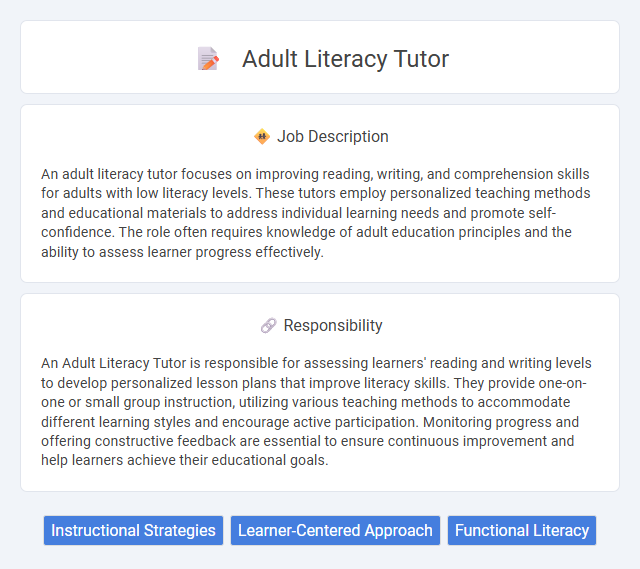
An adult literacy tutor focuses on improving reading, writing, and comprehension skills for adults with low literacy levels. These tutors employ personalized teaching methods and educational materials to address individual learning needs and promote self-confidence. The role often requires knowledge of adult education principles and the ability to assess learner progress effectively.
Individuals struggling with basic reading and writing skills may find a role as an adult literacy tutor rewarding and well-suited to their empathy and patience. Those who enjoy one-on-one interactions and have strong communication abilities are likely to thrive in this position. Conversely, people who prefer independent work or lack patience may find this job less suitable.
Qualification
An Adult Literacy Tutor typically requires a minimum of a high school diploma, with many employers preferring candidates who hold a bachelor's degree in education, English, or a related field. Certification in adult education or specialized training in literacy instruction enhances a tutor's qualifications, enabling them to effectively address diverse learning needs. Strong communication skills, patience, and experience working with adult learners are essential qualifications for success in this role.
Responsibility
An Adult Literacy Tutor is responsible for assessing learners' reading and writing levels to develop personalized lesson plans that improve literacy skills. They provide one-on-one or small group instruction, utilizing various teaching methods to accommodate different learning styles and encourage active participation. Monitoring progress and offering constructive feedback are essential to ensure continuous improvement and help learners achieve their educational goals.
Benefit
An Adult Literacy Tutor job likely offers significant personal fulfillment through helping learners overcome reading and writing challenges, enhancing their confidence and independence. This role may provide opportunities for skill development in communication and instructional techniques while fostering community engagement. There is a probable positive impact on societal literacy rates, contributing to broader educational and economic benefits.
Challenge
An adult literacy tutor likely faces the challenge of addressing diverse learning paces and educational backgrounds among students, requiring adaptable teaching methods. There may be difficulties in motivating adults who often juggle multiple responsibilities and may feel discouraged by past learning struggles. Overcoming these obstacles probably demands patience, creativity, and strong interpersonal skills to foster a supportive learning environment.
Career Advancement
An Adult Literacy Tutor plays a crucial role in enhancing learners' reading, writing, and comprehension skills, providing a foundation for lifelong education and employment opportunities. Career advancement in this field often involves specialization in ESL (English as a Second Language), curriculum development, or educational technology integration, increasing job prospects and earning potential. Pursuing certifications and higher education, such as a degree in adult education or literacy, further opens pathways to supervisory, training, and program management positions.
Key Terms
Instructional Strategies
Adult literacy tutors employ targeted instructional strategies such as phonemic awareness, vocabulary building, and comprehension techniques to improve reading and writing skills. They use personalized lesson plans and multisensory approaches to address diverse learning styles and overcome literacy barriers. Effective tutors incorporate real-life contexts and interactive activities to enhance engagement and retention in adult learners.
Learner-Centered Approach
An Adult literacy tutor employs a learner-centered approach by tailoring instruction to the unique needs, goals, and learning styles of each individual, fostering engagement and motivation. This methodology emphasizes active participation, critical thinking, and real-life application of literacy skills to improve reading, writing, and comprehension effectively. The tutor continuously assesses progress and adapts techniques to ensure personalized support that empowers adult learners to achieve functional literacy and lifelong learning.
Functional Literacy
An Adult Literacy Tutor specializing in Functional Literacy enhances learners' everyday skills, focusing on reading, writing, and numeracy essential for daily tasks like budgeting, form completion, and workplace communication. This role requires tailored lesson plans that address practical challenges, fostering independence and confidence in real-world situations. Mastery in assessing individual literacy levels and applying effective, learner-centered teaching methods is crucial for measurable progress.
 kuljobs.com
kuljobs.com